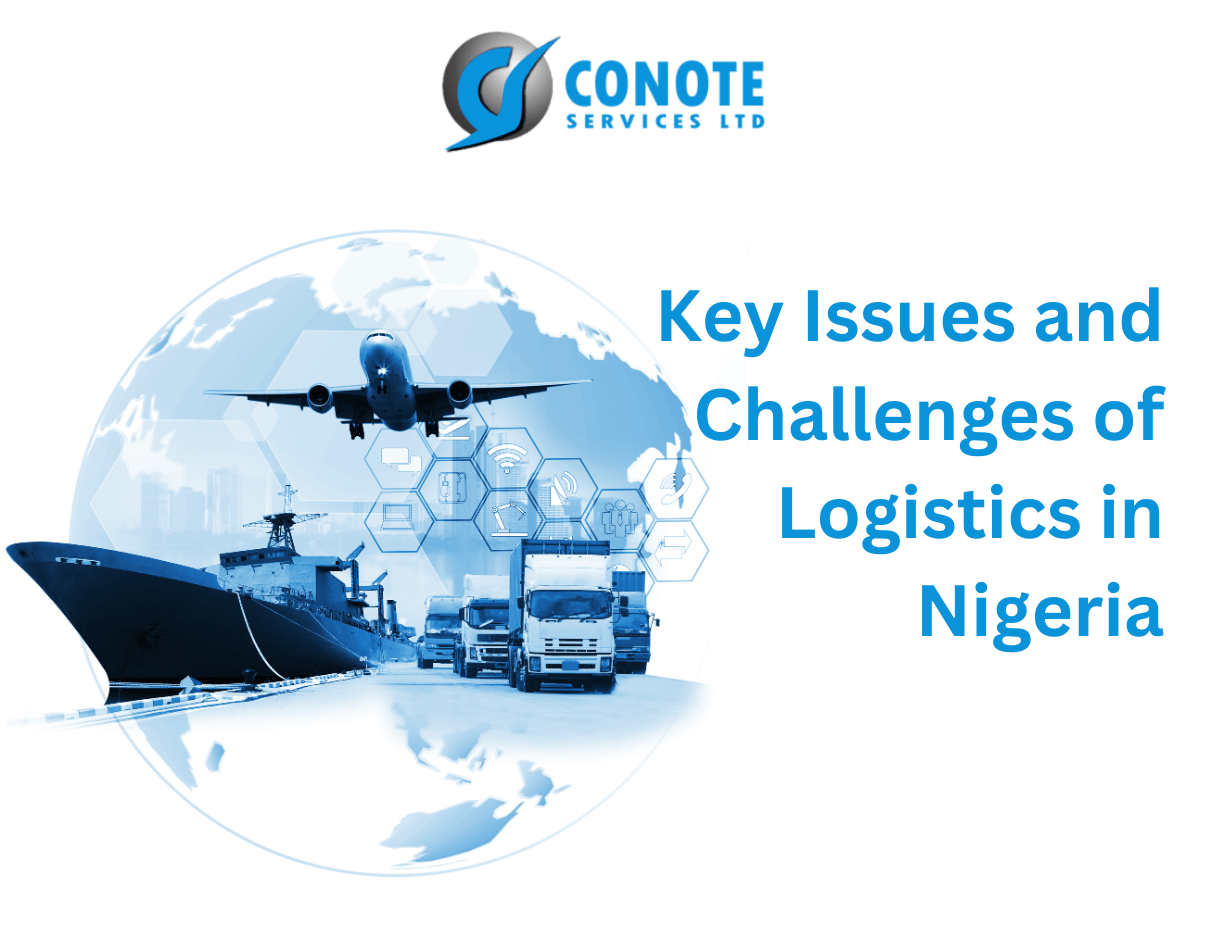Key issues and challenges of Logistics – Logistics is at the heart of economic activity, facilitating the smooth movement of goods, services, and information across various points. In Nigeria, a country with a burgeoning population and expanding economy, the logistics sector faces a multitude of challenges that hinder its optimal performance. This article, brought to you by Conote Services Limited, delves into the major issues plaguing Nigeria’s logistics industry, explores their economic implications, and suggests potential solutions to foster a more effective logistics framework.
Current State of Logistics in Nigeria
Nigeria, as the most populous country in Africa, holds immense economic potential. However, it grapples with significant infrastructural deficits, bureaucratic inefficiencies, inadequate transportation systems, and security concerns that cripple the logistics sector. These challenges escalate supply chain costs, cause delays, and compromise the integrity of goods in transit. The proliferation of checkpoints along transportation routes further exacerbates operational inefficiencies and increases business expenses.
Historical Background of Logistics in Nigeria
The foundation of Nigeria’s logistics sector dates back to colonial times when infrastructure was primarily designed for raw material exports. Today, this outdated infrastructure struggles to support a diversified economy that demands efficient movement of goods and services across regions. Years of under investment and governance issues have left the country with a transport network ill-equipped for modern economic demands.
Key Challenges Affecting Logistics in Nigeria
- Infrastructure Deficiencies: Nigeria’s transportation infrastructure—comprising roads, ports, and rail networks—is in dire need of upgrade and expansion. Poor road conditions, congested ports, and inadequate intermodal connectivity impede seamless logistics operations and escalate business costs.
- Bureaucratic Hurdles: Complex regulatory frameworks, unclear procedures at customs checkpoints, and administrative inefficiencies contribute to prolonged lead times and create opportunities for corrupt practices. Streamlining bureaucratic processes is crucial for enhancing supply chain efficiency.
- Government Policies: Inconsistent government policies and regulations often disrupt logistics operations and increase operational uncertainties. Recent examples include regulatory changes in licensing fees for courier and logistics firms, highlighting the sector’s vulnerability to abrupt policy shifts.
- Security Concerns: Persistent security challenges such as theft, vandalism, and attacks on transport assets pose significant risks to cargo safety and operational continuity. Insecure transportation routes not only jeopardize logistics personnel but also disrupt timely deliveries and incur financial losses.
- Multiple Taxation and Economic Instability: Logistics companies contend with multiple taxes and levies in an economically unstable environment. Uncertain economic conditions amplify operational costs, making it challenging for firms to maintain profitability and sustain growth.
- Driver Reliability: Ensuring the reliability and integrity of drivers remains a critical issue for logistics firms. Instances of driver misconduct, including theft and misuse of company assets, undermine operational trust and pose operational risks.
Future Implications and Possible Solutions
Addressing these challenges is pivotal to unlocking Nigeria’s logistics potential and fostering economic growth. Conote Services Limited recommends the following solutions:
- Infrastructure Modernization: Investing in upgrading transport networks to enhance connectivity and efficiency.
- Technology Integration: Leveraging technology for real-time tracking, monitoring, and management of logistics operations.
- Policy Reforms: Advocating for transparent and consistent regulatory frameworks to minimize operational uncertainties.
- Security Enhancements: Implementing robust security measures to safeguard transport routes and mitigate risks to cargo and personnel.
- Public-Private Partnerships: Encouraging collaboration between government and private sectors to drive infrastructure development and policy reforms.
Conclusion
The logistics sector in Nigeria plays a pivotal role in economic development but is hampered by systemic challenges that require urgent attention. By addressing infrastructure deficiencies, streamlining bureaucratic processes, enhancing security measures, and fostering a conducive regulatory environment, Nigeria can build a resilient logistics framework capable of driving sustained economic growth. Conote Services Limited is committed to embracing innovation and strategic partnerships as Nigeria strives to overcome its logistics challenges and harness the sector’s potential for national prosperity and global competitiveness.


